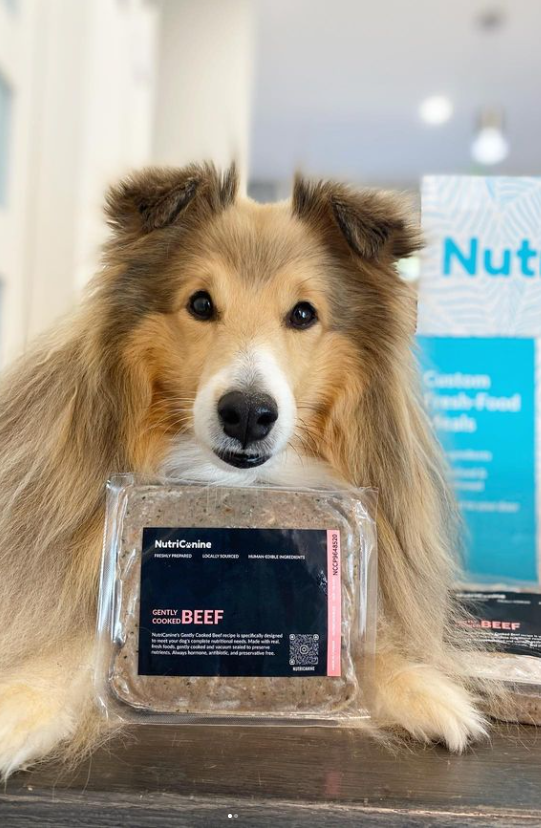“I have three pups, all picky eaters, and they devoured their meals! I’m so happy to have found a quick, easy and super healthy food.”
why Is NutriCanine good for my siberian Husky?


Lorem ipsum dolor sit amet, consectetur adipiscing elit, sed do eiusmod tempor incididunt ut labore et dolore magna aliqua. Ut enim ad minim veniam, quis nostrud exercitation ullamco laboris nisi ut aliquip ex ea commodo consequat. Duis aute irure dolor in reprehenderit in voluptate velit esse cillum dolore eu fugiat nulla pariatur. Excepteur sint occaecat cupidatat non proident, sunt in culpa qui officia deserunt mollit anim id est laborum."
Create the perfect meal plan for your Siberian HuskySiberian Husky

Height 51-60 cm

Weight 35-60 lbs
Lifespan 12-14years
Energy level High
Shedding Seasonal
Grooming Moderate
Get a custom meal plan designed specifically for your Husky
Get StartedSiberian Husky: Everything You Need to Know


The Siberian Husky breed was developed several centuries ago by the Chukchis of Northern Siberia. There are some indicators that the breed’s lineage dates back an estimated four thousand years or more. The Chukchis, a nomadic people, often used their dogs for various purposes - as a means of transportation, to keep their children company, and to assist in hunting for food.
In 1909, Siberian Huskies were brought to Alaska to compete in the long-distance All-Alaska Sweepstakes races. Dogs of all breeds, shapes, and sizes would compete in the 408-mile race with a first-place prize of $10,000. The Husky team proved themselves to be true contenders, finishing third place overall. Huskies continue to work as sled dogs today but are more commonly known as companion dogs. The breed was officially recognized by the American Kennel Club (AKC) in 1930.
Characteristics and Care
Appearance
The Siberian Husky is a medium-sized working dog. They weigh about 34 to 61 pounds and grow from 20 to 23 inches in height. The Siberian Husky has erect ears and almond-shaped eyes that can be blue, brown, or a combination of both. Huskies are always prepared for extreme winter temperatures with their medium-length, thick double coat.
Temperament
Siberian Huskies are pack animals who enjoy being around people and other dogs, especially ones they are raised with. Due to their high prey drive, Huskies have a tendency to chase cats, rodents, rabbits, and livestock. However, because of their friendly nature, Huskies do not make good guard dogs. These classic northern dogs are intelligent, independent, and strong-willed.
Grooming
The Siberian Husky coat has two layers. The top coat consists of long, thick guard hairs that provide protection from the elements. The undercoat is made up of soft, short hairs that act as an insulator, keeping them cool in the summer and warm in the winter. Siberian Huskies require weekly brushing to keep their coat shiny and healthy. Huskies shed year-round but have two heavy shedding periods in the spring and fall. Siberian Huskies also need regular nail trimming, ear cleaning, and dental care.
Training & Exercise
Siberian Huskies are very independent, so early positive training and socialization are important. As a working breed, Huskies have an innate desire to work. Since they love to run and explore, teaching them basic commands like sit, stay, come, and how to walk properly on a leash is a great place to start. Huskies are very active dogs that require plenty of exercise to be happy and healthy. It’s recommended that you keep your Husky on a leash or in a securely fenced area as they are known for being escape artists.
What Makes a Siberian Husky Unique
Siberian Huskies are known for their striking appearance, friendly temperament, and incredible stamina. Their history as working dogs in harsh climates has endowed them with a resilient nature and a love for physical activity. They are social animals that thrive in the company of their human families and other dogs. Their distinctive howls and vocalizations, along with their expressive eyes and playful demeanor, make them a truly unique and beloved breed. NutriCanine understands the unique needs of Siberian Huskies and is dedicated to providing personalized meal plans that cater to their specific requirements, ensuring they lead healthy and happy lives.
Health Considerations for Siberian Huskies
The Siberian Husky is generally a healthy breed with an average lifespan of 12 to 14 years. However, purebred Huskies do have several canine health problems that prospective owners should be aware of. Some common disorders Huskies are prone to include epilepsy, follicular dysplasia, hip dysplasia, hypothyroidism, ocular issues, von Willebrand disease (vWD), and zinc deficiency.
Epilepsy
Epilepsy is an inherited condition commonly found in Siberian Huskies between the ages of 3 months and 3 years old. This neurological disorder affects the brain’s electric activity and can cause your Husky to suffer from epileptic seizures, which are brief bursts of abnormal electrical activity in the brain. An epileptic episode can typically last between one and several minutes. It's important to be aware of the signs and symptoms of seizures to get your Husky medical help as quickly as possible. Some common signs to look for include twitching, tremors, shaking, and convulsions. Treatment might involve lifelong anti-seizure medication; however, this will help your Husky maintain a good quality of life. If your Husky is having a seizure, call an emergency vet and make sure they can’t injure themselves.
Follicular Dysplasia
Follicular dysplasia is a common health issue found in Siberian Huskies between 3 and 4 months of age. This genetic disease is characterized by excessive hair loss due to abnormal growth in the canine hair follicle. Some symptoms to look for in your Husky include scratching, patches of hair loss, red skin, self-injury due to extreme itching, and dry, scaly skin. Although there isn’t a sufficient treatment for this condition, your veterinarian may recommend specific shampoos, ointments, and creams to help soothe the symptoms.


Hip Dysplasia
Canine hip dysplasia (CHD) is one of the most common canine ailments. It’s a genetic condition that causes an abnormal formation of the hip socket, which can eventually lead to lameness and arthritis of the joints. This hereditary disease can be magnified by factors including excessive growth rate, age, types of exercise, and improper weight and nutrition. While mild conditions can be managed with prescription medication and physical therapy, more severe cases could require surgery. To prevent or reduce the severity of hip dysplasia, it’s important to ensure your Siberian Husky gets a proper diet and the right amount of exercise.
Hypothyroidism
Hypothyroidism is an inherited condition that is caused by a deficiency of the thyroid hormone. Due to the thyroid's widespread effects on the body, symptoms of hypothyroidism can vary. Some of the common symptoms to be aware of in your Husky include obesity, lethargy, slow heart rate, excessive hair loss, and weakness of the joints. Your Husky should have their thyroid levels tested annually as this condition can develop at any time. If your Husky is diagnosed with hypothyroidism, treatment is fairly simple and effective. With the assistance of medication, your Husky can go on to live a full life.
von Willebrand Disease (vWD)
Von Willebrand disease is the most common inherited bleeding disorder found in dogs and is frequently found in Siberian Huskies. This disease is a clotting disorder that causes excessive bleeding. It happens when there’s a deficiency of the protein von Willebrand factor. When an injury occurs, this protein is needed to help the platelets form blood clots to seal broken blood vessels. Symptoms can include nosebleeds, bloody urine or stool, and prolonged or excessive bleeding during or after surgery. Many dogs with a mild-to-moderate vWD diagnosis will require minimal treatment. For those with more severe cases, treatment is available to maintain a good quality of life for your Siberian Husky.
Hip Dysplasia
Canine hip dysplasia (CHD) is one of the most common canine ailments. It’s a genetic condition that causes an abnormal formation of the hip socket, which can eventually lead to lameness and arthritis of the joints. This hereditary disease can be magnified by factors including excessive growth rate, age, types of exercise and improper weight and nutrition. While mild conditions can be managed with prescription medication and physical therapy, more severe cases could require surgery. To prevent or reduce the severity of hip dysplasia, it’s important to ensure your Siberian Husky gets a proper diet and the right amount of exercise.
Ocular Issues
Unfortunately, Siberian Huskies are subject to a host of eye diseases and disorders including cataracts, corneal dystrophy, and progressive retinal atrophy (PRA). Cataracts: A cataract is developed when the lens of the eye clouds, preventing light from reaching the retina. Signs to watch for in your Husky include changes in eye colour, cloudy pupils in one or both eyes, confusion, and clumsiness. This condition can be treated with surgery, but if left untreated, can lead to blindness. Corneal Dystrophy: Corneal dystrophy is a hereditary disease that can cause opaqueness in the cornea or even hazy vision. If your Husky has this, you may observe small white dots in their cornea. This disease can be difficult to treat as it is progressive and irreversible. Progressive Retinal Atrophy (PRA): Progressive retinal atrophy (PRA) occurs when the retina of a Husky’s eye starts to deteriorate. Some dogs may experience total blindness, while others remain unaffected but can be carriers of the gene. There is currently no treatment that can cure this disease; however, you can learn to spot the signs early to ensure your Husky continues to live a fulfilling life. Some common signs to look for include night blindness, bumping into objects, and inability to follow hand signals/commands. It’s important to monitor your Husky’s vision to detect these eye conditions early on, especially in the first years of their life. It’s recommended that you have your Husky’s eyes checked by your vet on a regular basis.
Zinc Deficiency
Just like humans, Siberian Huskies need a sufficient amount of zinc to maintain optimal health. When Huskies experience zinc deficiency, this can lead to a skin infection called zinc-responsive dermatitis. This can happen if there’s not enough zinc in your Husky’s diet or they’re not absorbing it properly. Your vet can prescribe a regulated dose of zinc to help alleviate symptoms and ensure your husky is getting all the essential nutrients.
Nutrition for Every Stage and Need
Nutrition for Every Stage and Need description

As a very active breed, growing Siberian Huskies require a high-quality protein diet. Siberian Huskies are very active and require more calories than a typical dog of similar size. As a puppy, your Husky requires a well-balanced diet to grow up healthy and strong. For the first 12 months, puppies need to eat puppy food rich in protein and fats to support their growth and energy needs. NutriCanine's meal plans provide the perfect balance of nutrients to help your Husky puppy grow and thrive.

For adult Huskies, it’s important to maintain a proper balance of proteins, fats, and carbohydrates in their diet. Given their high energy levels, protein is crucial in maintaining muscle mass and supporting their active lifestyle. Additionally, fats are a necessary energy source to fuel their daily activities. NutriCanine's meal plans ensure that your adult Husky receives the right mix of nutrients to stay energetic and healthy.

As Siberian Huskies age, their nutritional needs change. Senior Huskies are prone to weight gain due to a decrease in activity levels. To maintain a healthy weight, their diet should include lean proteins and lower fat content. Joint supplements and other nutrients that support joint health are beneficial for older Huskies to help manage arthritis and other age-related issues. NutriCanine's meal plans can be customized to provide the necessary nutrients to support your senior Husky's health and mobility.

Overweight Huskies need a carefully balanced diet to help them lose weight while maintaining muscle mass and energy levels. NutriCanine offers personalized, pre-portioned meal packs tailored to your dog's needs, taking weight loss into consideration so there's no guesswork. These meal plans provide lower-calorie meals with the right balance of nutrients to support weight loss and overall health.

Some Huskies may have food sensitivities or allergies that require a specialized diet. NutriCanine's meal plans can be customized to exclude common allergens and include ingredients that are gentle on your Husky's digestive system, ensuring they get the nutrition they need without the discomfort.
Give Your Siberian Husky the Nutrition They Deserve
Every Siberian Husky deserves a meal plan that is tailored to their specific needs. NutriCanine’s personalized meal plans are designed to provide the optimal nutrition for your dog at every stage of their life. By taking into account their age, activity level, health conditions, and dietary preferences, we create a custom meal plan that ensures your Husky stays happy and healthy.
Top 10 Facts About Siberian Huskies
What is Lorem Ipsum?
Lorem Ipsum is simply dummy text of the printing and typesetting industry. Lorem Ipsum has been the industry's standard dummy text ever since the 1500s.
Our Gently Cooked Recipes
- Guided by science
- Made fresh daily
Our recipes, developed by an agronomist, are nutrient-rich, delicious, and complete and balanced, meeting AAFCO guidelines.
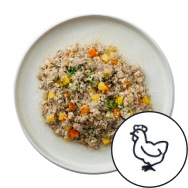
Chicken Recipe
Bowl lickin' good - bet we don’t keep our recipe a secret! For healthier skin and coat with nutrient-dense broccoli and carrots.
Learn More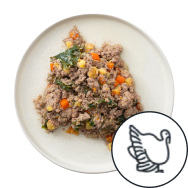
Turkey Recipe
Just like your Thanksgiving meal, but specially designed for your dog. For improved digestibility, enhanced by superfood kale and butternut squash.
Learn More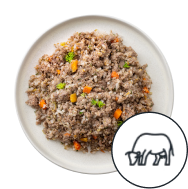
Beef Recipe
Perfect for the pickiest eaters and gluten-sensitive dogs with highly digestible rice and antioxidant-rich berries.
Learn More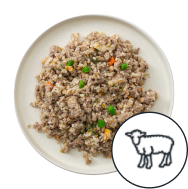
Lamb Recipe
Designed for dogs with allergies and sensitivities, enriched by nutrient-packed green beans and carrots.
Learn More Verified Purchase
Verified Purchase